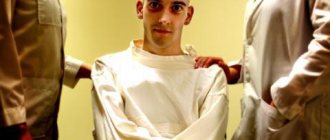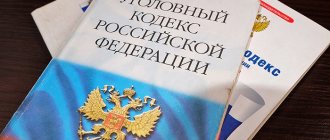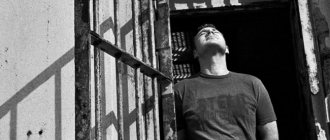1. In the cases provided for in part two of Article of this Code, compulsory measures of a medical nature are carried out at the place of serving imprisonment, and in relation to those sentenced to other types of punishment - in medical organizations of the state health care system that provide psychiatric care on an outpatient basis.
2. If there is a change in the mental state of a convicted person requiring treatment in an inpatient setting, the placement of the convicted person in a medical organization providing psychiatric care in an inpatient setting or another medical organization is carried out in the manner and on the grounds that are provided for by legislation in the field of health care.
3. The time spent in the medical organizations specified in parts one and two of this article is counted towards the term of serving the sentence. If there is no longer a need for further treatment of the convicted person in the medical organizations specified in parts one and two of this article, discharge is carried out in the manner prescribed by legislation in the field of health protection.
4. Termination of the application of a compulsory medical measure combined with the execution of a sentence is carried out by the court upon the proposal of the body executing the punishment, based on the conclusion of a commission of psychiatrists.
- Article 103. Crediting the time of application of compulsory medical measures
- Article 104.1. Confiscation of property
Commentary to Art. 104 of the Criminal Code of the Russian Federation
As stated above, for persons convicted of crimes committed in a state of sanity, but in need of treatment for mental disorders that do not exclude sanity, the court, along with punishment, may impose a compulsory medical measure. This measure, in accordance with Part 2 of Art. 99 of the Criminal Code of the Russian Federation can only be compulsory outpatient observation and treatment by a psychiatrist.
At the same time, the criminal law does not limit the types of punishments, the execution of which may be accompanied by outpatient compulsory observation and treatment by a psychiatrist. Therefore, this type of compulsory coercive measure can be prescribed along with such types of punishment as imprisonment, restriction of freedom, arrest.
Usually, an indication of these three types of punishment is limited in the literature, commentaries, and law to the listing of specific types of punishment, along with which outpatient compulsory observation and treatment by a psychiatrist can be prescribed. This approach is apparently explained by the fact that in Part 1 of Art. 18 of the Penal Code of the Russian Federation states that it is to those sentenced to restriction of freedom, arrest, imprisonment, suffering from mental disorders that do not exclude sanity that institutions executing these types of punishments apply compulsory medical measures by court decision. Other categories of convicts, i.e. sentenced to other than those listed in Part 1 of Art. 18 of the Penal Code of the Russian Federation, the types of punishments are not indicated. However, since they can be assigned, the question arises about the application of compulsory measures, for example, to those sentenced to correctional labor or compulsory labor.
So, in accordance with Part 1 of Art. 18 of the Penal Code of the Russian Federation, compulsory medical measures in relation to those sentenced to imprisonment are applied by correctional colonies and other institutions executing deprivation of liberty (in accordance with Part 2 of Article 101 of the Criminal Code of the Russian Federation, treatment and preventive institutions are organized in the penal system for medical care of convicts ( hospitals, special psychiatric and tuberculosis hospitals), medical units and other institutions).
———————————
Order of the Ministry of Health and Social Development of the Russian Federation and the Ministry of Justice of Russia dated October 17, 2005 N 640/190 “On the procedure for organizing medical care for persons serving sentences in prison and in custody” // Bulletin of normative acts of federal executive authorities. 2005. N 46.
Correctional centers apply coercive measures to those sentenced to restriction of freedom, and arrest houses apply to those sentenced to arrest. The use of compulsory medical measures in relation to those sentenced to other types of punishment is not regulated by criminal law. In Part 1 of Art. 104 of the Criminal Code of the Russian Federation states that, with the exception of those sentenced to imprisonment, compulsory measures against those sentenced to other types of punishment are carried out in health care institutions that provide outpatient psychiatric care. Thus, already at the level of the Criminal Code of the Russian Federation and the Penal Code of the Russian Federation, certain discrepancies are seen on the issue of the implementation of compulsory measures in relation to those sentenced to punishments not related to imprisonment.
An analysis of the current criminal and penal-executive legislation shows that the implementation of compulsory medical measures in relation to those sentenced to other types of punishment, with the exception of imprisonment, restriction of freedom and arrest, is entrusted to health authorities, namely to authorities providing outpatient psychiatric care.
In accordance with Art. 26 of the Law of the Russian Federation of July 2, 1992 N 3185-1 “On psychiatric care and guarantees of the rights of citizens during its provision,” outpatient psychiatric care to a person suffering from a mental disorder, depending on medical indications, is provided in the form of consultative and therapeutic care or dispensary observation.
However, consultative and therapeutic assistance is provided by a psychiatrist upon independent application of a person suffering from a mental disorder, at his request or with his consent, and in relation to a minor under the age of fifteen years - at the request or with the consent of his parents or other legal representative.
Therefore, in relation to compulsory treatment, we can only talk about dispensary observation, which can be established regardless of the consent of the person suffering from a mental disorder or his legal representative in cases provided for in Part 1 of Art. 27 of the said Law, and involves monitoring the state of mental health of a person through regular examinations by a psychiatrist and providing him with the necessary medical and social assistance.
———————————
Gazette of the SND of the Russian Federation and the Armed Forces of the Russian Federation. 1992. N 33. Art. 1913.
In relation to outpatient compulsory observation and treatment by a psychiatrist, performed by health authorities, the question arises about the adequacy of the possibilities and powers to use compulsory observation. It seems that this issue requires additional study at the legislative level.
During the period of serving a sentence and undergoing compulsory treatment, the mental state of the convicted person may change for the worse. In such situations, if there are medical indications, the convicted person may be placed in a psychiatric hospital or other medical institution in the manner and on the grounds provided for by the legislation of the Russian Federation on healthcare.
Attention should be paid to the fact that in Part 2 of Art. 104 of the Criminal Code of the Russian Federation no longer speaks of compulsory medical measures, compulsory treatment, but of a change in the mental state of the convicted person, requiring the organization of his treatment in a general manner in accordance with the legislation of the Russian Federation on health care. In this case, convicts may be placed in special psychiatric hospitals of the penal system. The time spent in these institutions is counted towards the term of serving the sentence.
If there is no longer a need for further treatment of the convicted person in these institutions, discharge is carried out in the manner prescribed by the legislation of the Russian Federation on healthcare.
Termination of the application of a compulsory medical measure combined with the execution of a sentence is carried out by the court upon the proposal of the body executing the punishment, based on the conclusion of a commission of psychiatrists.
Current criminal legislation provides for the application of compulsory medical measures only to persons suffering from mental disorders. But, excluding from Art. Art. 97 and 99 of the Criminal Code of the Russian Federation, an instruction on the use, along with conviction, of a compulsory measure of a medical nature in relation to persons suffering from alcoholism and drug addiction, by a court decision, the legislator by Federal Law of December 8, 2003 N 161-FZ “On bringing the Criminal Procedure Code of the Russian Federation and other legislative acts in accordance with the Federal Law “On Amendments and Additions to the Criminal Code of the Russian Federation” added Part 3 of Art. 18 of the Penal Code of the Russian Federation stipulates that mandatory treatment must be applied to such persons by decision of the medical commission.
———————————
NW RF. 2003. N 50. Art. 4847.
Differences between a judicial fine and a fine as a criminal punishment
The difference between a judicial fine as another measure of a criminal law nature and a fine as a type of punishment is as follows: the first is applied when releasing from criminal liability, the second is imposed by a court verdict if a person is found guilty of committing a crime. The difference also lies in the amount of the monetary penalty. The amount of a judicial fine is made dependent on the amount of the fine as punishment: the amount of a judicial fine cannot exceed half the maximum amount of the fine provided for in the relevant article of the Special Part of the Criminal Code. If the fine is not provided for by the relevant article of the Special Part, the amount of the court fine cannot be more than 250 thousand rubles.
Judicial practice under Article 104 of the Criminal Code of the Russian Federation
The appeal ruling of the Judicial Collegium for Criminal Cases of the Supreme Court of the Russian Federation dated October 2, 2018 N 5-APU18-54
considered the appeal of M. M. Makhmudov at the court hearing. on the resolution of the Moscow City Court dated July 31, 2018, by which Makhmudov Mizrob Murodovich’s complaint against the resolution of the Deputy Prosecutor General of the Russian Federation dated June 20, 2018 on his extradition to the competent authorities of the Republic of Uzbekistan for criminal prosecution for crimes under paragraph “d” of paragraph .3 tbsp. 104 and part 2 of Art. 109 of the Criminal Code of the Republic of Uzbekistan, was left without satisfaction.
Appeal ruling of the Judicial Collegium for Criminal Cases of the Supreme Court of the Russian Federation dated June 13, 2019 N 5-APU19-43
In accordance with Part 2 of Art. , part 2 art. , part 1 art. 104 of the Criminal Code of the Russian Federation to Vasilyev E.N. a compulsory medical measure was prescribed in the form of compulsory observation and treatment by a psychiatrist on an outpatient basis at the place where the sentence of imprisonment was served.
Appeal ruling of the Judicial Collegium for Criminal Cases of the Supreme Court of the Russian Federation dated October 29, 2019 N 92-APU19-5
In accordance with Part 1 of Art. , part 1 art. 104 of the Criminal Code of the Russian Federation Dandanyan M.Kh. compulsory medical measures were prescribed in the form of compulsory observation and treatment by a psychiatrist on an outpatient basis at the place where the main sentence was served. Based on Part 1 of Art. of the Criminal Code of the Russian Federation in relation to Dandanyan R.Kh. and Dandanyan M.Kh. appropriate restrictions are established and certain responsibilities are assigned to them.
Determination of the Judicial Collegium for Criminal Cases of the Supreme Court of the Russian Federation dated July 18, 2018 N 56-UD18-18
Based on Part 2 of Art. , clause “c” part 1 and part 2 art. , part 2 art. The Criminal Code of the Russian Federation prescribed a compulsory measure of a medical nature in the form of compulsory observation and treatment by a psychiatrist-narcologist on an outpatient basis in accordance with Art. 100, part 1 art. 104 of the Criminal Code of the Russian Federation at the place of serving the sentence of imprisonment;
Appeal ruling of the Judicial Collegium for Criminal Cases of the Supreme Court of the Russian Federation dated January 31, 2017 N 33-APU17-1SP
Based on Part 2 of Art. and part 1 art. 104 of the Criminal Code of the Russian Federation prescribed compulsory observation and treatment by a psychiatrist on an outpatient basis at the place of serving the sentence. 39,289 rubles were recovered in favor of G. as compensation for material damage.
Appeal ruling of the Judicial Collegium for Criminal Cases of the Supreme Court of the Russian Federation dated 02/08/2017 in case No. 50-APU16-23
In accordance with Art. 104- of the Criminal Code of the Russian Federation, it was decided to confiscate into state ownership: - funds in the amount of 55 thousand 232 rubles 15 kopecks located in the bank account N ... B. in PJSC "... ",
Appeal ruling of the Judicial Collegium for Criminal Cases of the Supreme Court of the Russian Federation dated August 30, 2017 N 81-APU17-11
Since Naumov N.V. suffers from a mental disorder (mixed personality disorder), which does not preclude sanity, and also taking into account the nature and degree of mental disorder of Naumova N.V., due to its characteristics and duration, as well as taking into account the conclusion of a forensic psychological and psychiatric examination, testimony of witnesses, examined criminal materials case, the court came to the reasonable conclusion that Naumov N.V. poses a danger to himself and other persons, in connection with which Naumov N.V., along with punishment, in accordance with Part 2 of Art. , clause “c” part 1 and part 2 art. , part 2 art. , art. 100, part 1 art. 104 of the Criminal Code of the Russian Federation lawfully prescribed a compulsory measure of a medical nature in the form of compulsory observation and treatment by a psychiatrist on an outpatient basis.
Appeal ruling of the Judicial Collegium for Criminal Cases of the Supreme Court of the Russian Federation dated September 12, 2017 N 43-APU17-7
In accordance with paragraph “c” of Part 1 of Art. , part 2 art. , art. 100, part 1 art. 104 of the Criminal Code of the Russian Federation Nesmelova N.V. a compulsory medical measure was prescribed in the form of compulsory observation and treatment by a psychiatrist on an outpatient basis at the place where the sentence of imprisonment was served.
Appeal ruling of the Judicial Collegium for Criminal Cases of the Supreme Court of the Russian Federation dated August 24, 2017 N 50-APU17-9SP
Contrary to the argument of Mukhtorov’s complaint, the court, in accordance with the provisions of paragraph “g” of Part 1 of Art. 104- of the Criminal Code of the Russian Federation justifiably decided to confiscate the instruments of crime, including 23 knives belonging to Mukhtorov, since, according to the verdict of the jury, these weapons were also in service with the gang members.
Appeal ruling of the Judicial Collegium for Criminal Cases of the Supreme Court of the Russian Federation dated December 28, 2017 N 67-APU17-24
The Renault SR car, owned by the convicted Gulenok, was confiscated to the state in accordance with paragraph “d” of Part 1 of Art. 104- of the Criminal Code of the Russian Federation, as an instrument of crime, since Gulenok used it when committing a crime - the illegal sale of narcotic drugs (he transported narcotic drugs in it to places of hiding places).
Appeal ruling of the Judicial Collegium for Criminal Cases of the Supreme Court of the Russian Federation dated December 27, 2017 N 86-APU17-9
Based on Part 2 of Art. , clause “***” part 1 art. , part 2 art. , part 1 art. 104 of the Criminal Code of the Russian Federation was decided to apply in relation to Ladygin I.G. a compulsory measure of a medical nature in the form of outpatient compulsory observation and treatment by a psychiatrist.
Determination by the court of the amount of the court fine
The amount of the court fine imposed by the court upon release from criminal liability cannot exceed half the maximum amount of the fine provided for by the relevant article of the Special Part of the Criminal Code of the Russian Federation. When the fine is not provided for by the relevant article of the Special Part of the Criminal Code of the Russian Federation, the amount of the court fine cannot be more than two hundred and fifty thousand rubles.
Within these limits, the amount of a judicial fine is determined by the court, taking into account the gravity of the crime committed and the property status of the person exempted from criminal liability and his family, as well as taking into account the possibility of the said person receiving wages or other income (Article 104.5 of the Criminal Code of the Russian Federation).
Determination by the court of the deadline for payment of a court fine
The deadline for paying a court fine is determined by the judge (court), taking into account the financial situation of the specified person and his family. It seems that the judge (court), in order to determine the duration of this period, may also take into account: the possibility of a person receiving wages or other income, the presence of dependent minor children, elderly people and other circumstances.
In contrast to court decisions on exemption from criminal liability on the grounds provided for in Art. Art. 75 and 76.1 of the Criminal Code of the Russian Federation, a court decision on release from criminal liability with the imposition of a court fine in itself is not final for the person in respect of whom it was made. It becomes such only if this person has paid the court fine assigned to him within the prescribed period (before the expiration of the specific date specified in the court decision).








